Paula Vince's Blog: The Vince Review
September 23, 2025
'The Infernal World of Branwell Bronte' by Daphne du Maurier
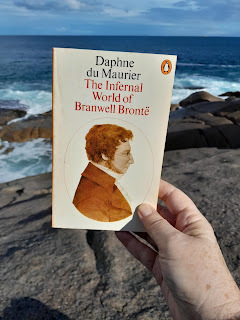
This review is my tribute to a tortured soul on the anniversary of his death, for Branwell passed away all too soon on this very date in 1848. He's a young man whose plight has a way of lingering on my mind. I discovered this book at a great little seaside secondhand bookshop, and instantly bought it to add to my collection of Bronte lore.
MY THOUGHTS:
This book is written in a documentary style. Daphne du Maurier was a huge fan of the Brontes, and it's very cool to see her tackle a non-fiction project of this calibre, changing her setting for once from her beloved seaside Cornwall to the chilly inland Yorkshire moors.
She begins with the death of the unfortunate Branwell, aged just 31, then delves back into his past to examine the tragedy of the boy who got nowhere. Early on, he's described as, 'quick tempered, excitable, and as full of mischief as a bog pixie.' She explores how the sudden deaths of his two eldest sisters shocked the eight-year-old into 'an apprehension that would never leave him, that would for years fill his dreams by night, however much energy and fury he put into his days.'
Branwell Bronte was regarded by his family as a boy prodigy. He had an extensive vocabulary, photographic memory and fertile imagination. His peers were impressed by his ability to write two letters at once, holding one pen in each hand. He also played piano, which he did in his capacity as a junior member of the Freemasons. And he was quite a talented portrait painter, plugging away in his early twenties at his own business in Bradford. He even invented his own dialect for the fantasy land of Angria which he shared with his sister, Charlotte. The pair of them nicknamed their setting, 'the infernal world,' giving the title of this biography a grim double meaning.
It is sad to reflect that Reverend Patrick himself, for the best of reasons, might have been a catalyst in stuffing up his son's life. He strikes me as similar to the well-meaning menace in the old fable who attempts to rip open the cocoon for an emerging butterfly, thus causing its premature death. Perhaps Mr Bronte was too vigilant a caretaker. His valiant efforts to shield his sensitive son, and make his passage through the world as pain free as possible, stifled the frustrated young man who discovered, aged 20, that the sheltered lifestyle had fitted him for nothing. As a huge advocate for home education I don't say this lightly, but it might have been the wrong fit for Branwell in many ways.
(However, I can't censure Reverend Patrick too severely, because he may well have been right. If he'd pushed Branwell into the brutal school system of that era, that may have proved disastrous in a totally different way. What a lose-lose situation.)
Reading this has stirred my sympathy for Branwell. It's easy enough for us in the 21st century to declare, 'He should've got his act together,' or, 'He didn't have what it takes.' But we're talking about the eight-year-old who was traumatized by the senseless deaths of two beloved sisters, and the 25-year-old who received a brutal triple blow with the loss of a vivacious young family friend, a best buddy of his, and the aunt who'd taken the place of his mother, almost all at once.
He'd travailed at his aunt's bedside during her final agony while his sisters were away. And he suffered this grief at a time when it was a cinch to buy opium over the counter at the local chemist to dull any type of pain.
Branwell was surely delusional at times, and wrote more than his fair share of waffly, egotistical letters, as du Maurier's extracts prove. I'm sure he was the dubious model for some of his sisters' drunken characters, such as Anne's Arthur Huntingdon and Emily's Hindley Earnshaw. It's easy to see how Branwell would've annoyed the heck out of everyone who knew and loved him, yet in spite of all this he was probably a courageous soul to have been as fun-loving as he reportedly was.
Overall, you cannot help but feel compassion for this young man who pours his prodigious output into the deaf ears of an indifferent world, becoming famous on the coattails of his sisters for all the wrong reasons. He never wanted to be remembered for posterity as a fall-short, drunkard, and hopeless wreck, but a life of nothing but deferred hope takes its toll on a person's body, soul, and spirit. How could Branwell avoid bearing on his shoulders the demoralizing identity as a failure, especially with such a lot riding on his status as the 'The Son' in a patriarchal society, and the shining hope of his sisters.
How about that famous pillar painting of his, which he reputedly attempted to scrub himself out of. Almost two centuries later, traces of his image now show through a bit. This may be taken as a positive reinforcement that he truly deserves his spot along with his sisters in the family image. But if you're anything like me, the darkly comedic thought might have crossed your mind that he couldn't even get that right!
Regarding the big scandal of his life, his relationship with Mrs Lydia Robinson, du Maurier paints her in a more sympathetic light than many Bronte biographers do. I find this very interesting, since she focuses her research on Branwell in particular, comes to understand him well, and conjectures that he may have blown a whole lot out of proportion in his usual delusional way. Also fascinating is the interesting evidence that Branwell may have written or collaborated with Emily on at least a portion of Wuthering Heights. (More on that another time.)
Isn't life full of irony. One of Branwell's idols, and embodiments of success out of his reach was a poet named William Deardon. Poor Branwell longed for similar standing in the eyes of the world, yet as du Maurier points out, Deardon's only claim to fame now is having heard a live reading from Wuthering Heights straight from the lips of Emily Bronte's brother.
We'll never know how Branwell might have got along had he been born in the 21st century. I'm sure he would've found it a hard slog with all his personal issues, including whatever nervous and medical conditions ailed him along with probable bi-polar disorder. But I'd be willing to bet it might've suited him more than the infernal nineteenth century, to borrow his own term, and at least he might've survived beyond the age of 31.
🌟🌟🌟🌟
September 16, 2025
'Fangirl' by Rainbow Rowell
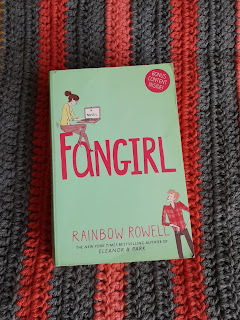
Summary: A coming-of-age tale of fanfiction, family, and first love.
MY THOUGHTS:
Some anonymous donor dropped this novel off into our Little Free Book Library, and I considered it very timely, for I meant to read it someday. I know this book has been doing the rounds for years and since it found its way to me, I've got onto it at last.
The heroine is an introverted 18-year-old named Cath, who has a thriving fanfic following incognito. Her writing revolves around the Simon Snow series, a global phenomenon about an 11-year-student who attends a school of magick. (Yep, of course it's a thinly disguised replica of Harry Potter.)
Meanwhile Cath's real life is fraught with difficulties. Her identical twin, Wren, is all for extroverting, drinking, and partying. Their single dad, Arthur, is a workaholic in the creative field of advertising, ever on the verge of breakdown, and their mother, Laura, who left when the girls were eight, is extending feelers after a decade of absence. Cath's roommate, Reagan, is a super-cool chick, and Reagan's best friend, Levi, is an effervescent soul who takes an interest in Cath, which is disconcerting. On top of all this is actual course work too.
The most abrasive character for me is Professor Piper, the popular teacher who gives Cath an 'F' on a fiction writing assignment because it's fanfic. The professor is horrified for all the conventional reasons. Because Cath has adopted another author's created world and characters, Piper considers it plagiarism and theft of creative property.
Her reasoning strikes me as somewhat shallow and reactive. The HUGE popularity of this style of writing alone fails to convince the Prof Pipers of the world that fanfic is a powerful tool for promoting positive social change. When well-beloved stories of our culture are tweaked to offer fresh insights, the resulting works of literature sometimes pack a greater punch than brand new material ever possibly could. It has been done in various forms for centuries. But even when Cath likens it to repurposing and recycling, Professor Piper won't budge from her fixed point of view.
Perhaps I'm negatively biased because this character has stepped on my toes, but as well as her narrow-mindedness, I find Piper's attitude of favoritism makes me gag. Every other student in the class must twig that Cath, despite her dwindling enthusiasm for the subject, is the teacher's pet. What Professor Piper is willing to do for one, such as extending deadlines unsought, she ought to do for every single student. So this professor has become one of those occasional characters who I don't like even though the author intends us to.
The ending is somewhat disappointing. The story simply sputters to a stop. Several threads we're invested in are left dangling. However, I suppose the fact that I wanted them to go on, having plowed through almost 450 pages already, proves the compelling nature of Rowell's writing.
Overall, I enjoyed Fangirl. The characterization and dialogue are great, and the premise of a quiet and awkward young student who's secretly building a massive fanfic following is a winner for me. To quote Cath, 'I'd rather pour myself into a world I love and understand than try to make something up out of nothing.' It's a totally valid stance and I find it almost a shame that she finally caves in to pressure to write an original story. (Mild spoiler - the fact that Cath wins a prestigious prize for it after cranking it out so grudgingly makes me feel sad for other students who pour everything into their own efforts.)
There is a sequel, or rather a companion novel to this one, entitled Carry On! We readers are to take it as the actual fan-fiction written by Cath throughout this novel, which sets my brain spinning. We are essentially being offered a fanfic by a fictional character about a non-existent book series. Even though there is no such thing as the original Simon Snow series by Gemma T Leslie, that hasn't stopped thousands of readers willing to read fanfic about it. Am I weird in preferring to stick to fanfics which are at least based on some existing material we can compare it with?
🌟🌟🌟🌟
Note: If you'd like to explore my fanfiction page, including those I've read and those I've written, start here.
September 9, 2025
'Digital Minimalism' by Cal Newport
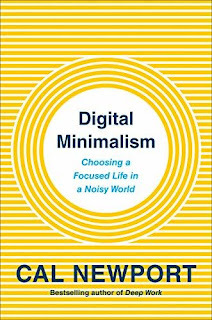
In this timely and enlightening book, the bestselling author of Deep Work introduces a philosophy for technology use that has already improved countless lives.
MY THOUGHTS:
Cal Newport's voice is widely known for speaking dire warnings about the consequences of our twenty-first century online habits. He strikes me as someone standing in an Old Testament prophet sort of role, with one crucial difference. While those biblical prophets were brushed off as melancholic loonies during their own era, I think we all know in our deepest hearts that Newport speaks wisdom and common sense. As a race, we often simply prefer to drift along, spending passive hours on social media platforms anyway, driven by FOMO and the possible hope of positive reinforcement.
This is why I feel books such as this one give me the indignant drive to actually see what's going on and do something about it. Here comes a brief summary of how Newport's research and study helps pull the wool away from my eyes.
The smart entrepreneurs at Silicon Valley who set up our social media platforms play on our weaknesses. They know all about the power of intermittent reinforcement and quick dopamine fixes. But the problem for us as individuals is that any form of addiction is no good for us. These surges of dopamine play havoc with our overall contentment and wellbeing, yet we still fall for it. And when reinforcement in the form of likes, hearts, taps, and comments is not as frequent as we'd hope, the resulting sadness can cast a pall over our days. But it's a lose-lose situation, for even when it is forthcoming, we then set our bars higher and aim for even more.
When I was about 19 years old, studying undergraduate Psychology, part of the mandatory course material was an experiment with poor rats down in the laboratory. We had to test their willingness to press a bar that distributed a handful of food pellets, and examine the power of intermittent reinforcement. I've never forgotten that, and feel certain that whistle blowers like Cal Newport are quite correct in pointing out that we ourselves are being played for rats, all so that some corporate giants can keep lining their own pockets. For if we regard ourselves as the consumers of social media platforms, he turns it upside down in pointing out that we are, in fact, the product. Big monopolies and advertisers are the 'consumers' who count on our taps and engagement in this attention economy.
Newport also examines Henry David Thoreau's theory of 'new economics.' In a nutshell, for each small gain any activity might confer, Thoreau would examine the extreme cost on the other side of the scales. In Thoreau's nineteenth century example, a fine house with the best quality curtains, wallpaper and furnishings was paid for with the time, toil, maybe even blood, of hard work. In the case of our modern, digital era, Newport suggests that for our regular social media engagement and scrolling, we're sacrificing huge chunks of time, valuable solitude, quality of mood, shredding our attention spans and possibly straining our relationships. In a nutshell, we are paying for it with our lives.
Solitude Deprivation is a serious repercussion of our online era because many of us are spending zero minutes of time solely with our own thoughts, away from the non-stop input from other minds. The way Newport puts it is that, 'prioritizing communication over reflection is a source of serious concern.' Hence, he advises us to consistently create our own metaphorical cabins away, similar to Thoreau's actual cabin by Walden Pond. Possible ways of doing this may be taking long walks with our phones tucked away, journaling our reflections, and choosing high quality leisure, such as demanding arts and crafts.
What I like about this book is that Newport isn't advising to quit our online lives completely. He advises us to take a month-long detox, then honestly assess whether each social media platform directly supports something we deeply value (for the fact that it offers some value is irrelevant). And oh man, after reading all of this, I feel seriously inclined to pare back even more than I already have.
I'm not giving five stars because some of Newport's counsel strikes me as somewhat extreme. Since he believes that nothing can beat real time spent with friends, either face-to-face or over the phone, he recommends never clicking likes or hearts on social media at all as a general rule. In Newport's opinion, these multiple 'on-line' friendships give us the mere illusion of 'real' relationships. Perhaps he's right to some extent, but as a shy introvert, I treasure my on-line friendships as more genuine than he gives them credit for. As for sending PMs or text messages instead of picking up the phone, having these wonderful options at my fingertips has been a game-changer for me. Making actual phonecalls was always something I dreaded, for when you think about it, you're surely interrupting people, whether it's welcome or not.
I don't review or outline all of the non-fic books I read, but make an exception for potentially life-changing ones with valuable content. Newport's suggestions of 'high quality leisure' to replace this mindless scrolling is cool to read (like creating blog content like this). He sets us pondering whether or not we'd still voraciously use Facebook, Instagram, TikTok, X, and all the others if we had to pay for it. As for me, I'll certainly think carefully before I obey any impulse to check my stats on the sites I do value, namely this blog and Archive of Our Own. Do I really need to know right this second?
If you've ever been remotely anxious about digital well-being, then this is one of the books I'd recommend.
🌟🌟🌟🌟
September 2, 2025
'Nemesis' by Agatha Christie
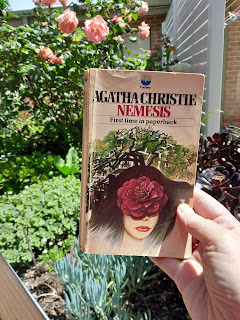
Summary: In utter disbelief, Jane Marple read the letter addressed to her from the recently deceased Mr Rafiel - an acquaintance she had met briefly while on vacation in St. Honore, as recounted in "A Caribbean Mystery."
Rafiel had left instructions for her to investigate a crime after his death. The only problem was, he had failed to tell her who was involved or where and when the crime had been committed. It was most intriguing. Soon she is faced with a new crime - the ultimate crime - murder. It seems someone is adamant that past evils remain buried.
MY THOUGHTS:
Miss Marple notices the name of an old acquaintance, Mr Rafiel, in the death column. It turns out he's bequeathed her £20 000, provided she solves a mystery with details he's very sketchy about. Rafiel has booked her a place, seemingly from beyond the grave, on a bus tour of famous houses and gardens of Great Britain. Miss Marple has no idea what she's meant to do but await further instructions from the dead man. It seems Mr Rafiel was determined not to influence her mindset, yet Miss Marple feels that going in blind is ridiculous.
It turns out that Rafiel's only son is in jail, convicted of murdering his own fiance long ago. Young Michael Rafiel was generally regarded as a 'bad lot.' His father considered him 'morally sick' and beyond the hope of reform, yet believed him innocent of this heinous crime. His dying wish was to have it proved. The question is, who was the real murderer? Should Miss Marple consider any of the other passengers on the tour, or maybe one of three sisters who lives in the vicinity of their first stop?
The need for resolution becomes more urgent when another coach passenger, (I won't divulge who), is killed by a falling boulder. The fact that this person also seemed on the trail of young Verity's murderer convinces Miss Marple that this was no freak accident. Especially since two other young passengers are certain they saw an unidentified figure rolling the huge rock. Now there is at least one other murder involved, Miss Marple desperately doesn't want to fail.
Some of her own beliefs make this story quite interesting. Throughout her long life, Miss Marple has noticed that, 'curious connections of incidents with special subjects seem to happen to people in life,' and in her own case, murders have a way of happening in her vicinity. (If Miss Marple happens to walk into your cafe, get out quick smart.) But her 'fine sense of evil' helps her get to the bottom of them.
Regarding evil itself, she remarks:
'I don't like that sort of thing. If you expect me to feel sympathy, regret, urge an unhappy childhood, blame bad environment; if you expect me, in fact, to weep over him, this young murderer of yours, I do not feel inclined to do so. I do not like evil beings who do evil things.'
And her new friend, Professor Wanstead, expert on the criminal brain, replies:
'I'm delighted to hear it... If people knew the bad environments that people have had, the unkindness, the difficulties of their lives and the fact that nevertheless they can come through unscathed, I don't think they would so often take the opposite point of view.'
I figured out the murderer. This person was on my radar for similar reasons to those which occurred to Miss Marple. Since every fellow passenger had suspect potential, this should have been way harder to figure out than it was. I consider it a middling Marple mystery, so perhaps it's a good thing it was the last.
Finally, the fact that the coach tour carried on after a passenger's tragic accident dates this 1971 publication! Holy Moley, my daughter who works in the travel industry confirms that if it happened in the 21st century, the rest of the tour would be cancelled as a matter of course and all the passengers refunded.
🌟🌟🌟
August 26, 2025
More Gifts from the Sea

Currently, our beautiful South Australian coastline is being devastated by a widespread algal bloom named karenia mikimotoi. I can almost type that straight off without checking the spelling, since it's been in our news headlines so frequently. Its effect on the sea in which it spreads is pernicious, since it's toxic to hundreds of different forms of marine life. That's ravaged our seafood industry, and I've personally seen dead fish and stringrays washed up along my favourite beaches. You can see from my photo above that this not normal foam, but more like a horrific, marshmallow ooze. Its cause is attributed to converging factors. Drawn-out summer heat caused unusually warm ocean temperatures, which were exacerbated by the lingering effects of some serious river flooding a couple of years ago. Since I moved to the coast with my family around seven years ago, I've never taken this soothing setting for granted, and to see it like this makes me long for the end of the scourge even more.
From the sound of the scientific reports we've been following, it's a matter of waiting it out, since the situation is dynamic, responding to daily conditions.
In the meantime, since my mind has been on the ocean, I thought I'd compile more sea-themed literary excerpts and quotes, to follow on from this one, which included words from Laura Ingalls Wilder, Anne Bronte, and Walt Whitman, among others. As I keep reading, I come across increasingly more incidents in which fictional characters are awed by their glimpses of the ocean.
1) In her novel Longbourn, Jo Baker's young character, James Smith, is amazed by his first sight of the ocean, as a roving soldier in the British army. 'Glimpsing it for the first time, he was astonished by the silver brilliance of the sea, the way it just kept moving, but never shifting from its place. It seemed at once beautiful and monstrous.'
2) In Emil and the Three Twins, a wonderful German kids' classic from the 1930s, Frau Heimbold and her two grandkids, Emil and Pony, share a surreal moment when they view the sea for the first time. 'At the edge of the shore began the sea. Whichever way they looked, there was no end to it. It seemed to be made of liquid mercury. Far off on the horizon a ship was sailing into the falling night... The two children and their grandmother were overwhelmed. They stood there in silence, feeling as if they would never speak again in their lives... Eventually Emil's grandmother said softly, 'At last I know why I've lived to be such an old woman.'
And the next day, 'Sometimes a succession of waves ran across the surface of the water, and Pony remarked: 'It looks as if an invisible shop assistant was unrolling bright silk on an endless counter.'
3) In Barbara Kingsolver's epic Demon Copperhead, all the young hero's attempts to visit ocean have been thwarted until the very final chapter. He's on the cusp of viewing it at last, with his love interest Angus (aka Agnes) Winfield.
Angus: I'm serious, I'm giving you the ocean.
Demon: It's winter.
Angus: You know what. They don't roll it up and put it away. It's just sitting there. Take it or leave it, home skillet. One goddamn Atlantic Ocean on offer.
4) Salesian priest Flor McCarthy's wonderful reflection. This treasure is found in secondhand book I picked up long ago entitled, 'Windows on the Gospel.' Here, he is addressing the sea as a perfect destination to get away to.
'It would be hard to find a more suitable place. Here one experiences greatness and grandeur. Everything speaks of permanence and timelessness, the ceaseless ebb and flow of the tide, the sound of the surf that is never stilled, the infinity of sand grains beneath my feet, the horizon which seems so near yet can never be reached, the immensity of the star-strewn sky above me. There is a little bit of eternity of every seashore. Yet nowhere does one experience one's own finiteness so acutely. I look at the clear footprints I leave behind me in the soft sand and realize they won't survive even one tide. Suspended between time and eternity, I am at once humbled and elevated.'
5) Finally, I'd like to include this excerpt from the fanfic, based on Louisa May Alcott's Little Men, which I've recently completed. In this scene, Uncle John tries to understand why Emil, his sea-mad teenage nephew, can't shake off an all-consuming desire to go to sea.
'His uncle filtered some cool earth between his fingers. ‘You probably wouldn’t remember, but Uncle Laurie and I once took you and Franz for a boat ride. It was soon after your Uncle Fritz married your Aunt Jo. Your brother was content to sit still, but we kept having to pluck you back by your shirttails, because you were so obsessed with the thought of glimpsing a mermaid or hydra.’‘I do remember that day,’ Emil said. ‘I thought I saw a giant kraken and leaned over so far I got my nose wet.’
‘Well, now that you’re fourteen, you do realize those beings are mythical, don’t you?’ Uncle John cleared his throat and twisted his fingers together. ‘Uh, they don’t really exist.’
‘I know what the word mythical means, Uncle John.’ Emil took care not to sound irritated.
His uncle turned a shade of red. ‘Of course you do. So now since the magical element is gone…’ he cut his hand through the air, ‘you still want to go, even though you know the prosaic truth?’
Emil began shaping a dirt tower with his hands. ‘Sure, I probably won’t see mermaids, sirens, or hydras. But there’s still a good chance I’ll see whales, porpoises, octopuses and dolphins. Maybe even a shark or two. So what you call the prosaic truth is still magical enough for me, sir.’

And up above is another shot I took very recently of our sick sea, this time behind Granite Island. You can see that crusty ick that floats on the surface. It's heartbreaking to simply wait this natural disaster out, but if you're the sort of person who prays, please keep our situation in mind.
August 19, 2025
'The Ladies of Missalonghi' by Colleen McCullough
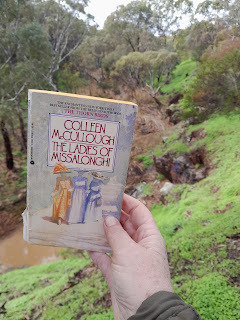
After decades of not giving this book a thought, it popped into my head out of the blue, and I thought I might like to read it, although I had reservations in my teens when it was published for reasons which you'll read below. Just a few weeks later, I discovered a copy in a Little Free Library in a small Yorke Peninsula town named Warooka. I assumed reading it was meant to be, so I'm including it in the Romance category of my 2025 Aussie Reading Challenge. The back cover blurb calls it a 'magical romance' and tale of dreams come true.
MY THOUGHTS:
The time period is early twentieth century, leading into WW1. The setting is a fictional town named Byron in the stunning Blue Mountains not far from Sydney. Missy Wright, a drab 33-year-old spinster, ekes out a spartan existence with her widowed mother, Drusilla, and invalid aunt, Octavia. They are bottom in the pecking order of their wealthy relatives, the Hurlingfords, who virtually control the whole town.
But something is stirring in Missy's stagnant, routine world. A possible diagnosis of terminal heart disease looms over her, leading her to question the inhibited way she's always done things. Driven by a rebellious instinct to have a little fun before she dies, Missy feels a scandalous attraction to John Smith, an auburn-haired 'cloud of energy' who has just purchased an extensive section of valley land which her own clan hadn't even realized was for sale. His sole purpose is to live alone, answerable to nobody. (Even Missy's wealthy Aunt Aurelia considers his generic name hard to believe. 'One is forever reading about John Smiths, but have you ever actually met one?' It is easy to wonder if he has something to hide.)
If you think all this sounds strikingly similar to Lucy Maud Montgomery's The Blue Castle, you'd be absolutely right. I never read TLOM back in 1987 when it was first published, but I remember the literary furore as McCullough was called out for plagiarism of ideas, and denied the accusation, claiming that she must've read TBC in her youth, and then subliminal memories evidently bubbled to the surface. Back then, as a loyal teenage Montgomery fan, I declined reading TLOM out of principle. The case was eventually dropped as nobody could dispute McCullough's word.
Fast forward to now. Fan fiction is an extremely popular twenty-first century concept and I love re-imaginings of excellent plots in different settings. Having ripped through this, I consider TLOM to be a great Aussie replica of TBC. Missy's truly gorgeous, but flat-voiced and calculating cousin Alicia is an awesome counterpart to Valancy Stirling's perfect cousin Olive. In fact as a whole, the Hurlingford connection is even easier to hiss and boo than Valancy's Stirling clan, for rather than being merely pompous and annoying, they are corrupt and callous crooks who prey on widows and orphans.
All these years later, I'd urge anyone to go ahead and read it. Our distinctive Aussie cheekiness along with a few risque innuendoes adds some spice. Although the two plots share the same foundation they don't play out identically in every respect. The twists are quite different but equally surprising. After willingly swallowing the unlikelihood that both Missy Wright and John Smith would choose to step so far out of character as we see here, it becomes easier to suspend disbelief all the way through. I just grinned at the shock supernatural machinations, as it's all in good fun.
This book has the added appeal of lovely illustrations by Peter Chapman. The wonderful setting along with Missy's eventual triumph in living a simple life on her own terms, free of pecuniary stress, certainly made me feel happy, so grab refreshments of your choice and put your feet up. Morning tea for the Missalonghi ladies has an authentic national vibe, including pikelets with jam and cream, a sponge, some little butterfly cakes, and sour apple tart with cloves. That might be a good place to start.
And just for the record, I was probably wise to wait until now, for I'm not sure this would have been to my liking at the age of 17.
🌟🌟🌟🌟
Note: The more I think about this, the sadder I feel that the controversy ever happened, for even if McCullough's critics were correct in accusing her (which wouldn't surprise me since the similarities were spot-on in so many respects), she's done no different than what Barbara Kingsolver did far more recently with Demon Copperhead, which won a Pulitzer Prize.
I guess the key difference is that while Kingsolver was quite open and aboveboard about her recycling of David Copperfield, McCullough's example was more sneaky and underhanded, if indeed it was intentional at all. And while The Blue Castle is soon to celebrate its publication centenary in 2026, it had just tipped its 60th anniversary back in 1987, which was nowhere close to becoming public domain. I guess it's a lesson to anyone who might take it into their heads to rip off Canada's national treasure with no acknowledgement whatsoever. If the whole thing really was planned, did McCullough honestly think nobody would ever notice?!
Even though it was never hailed as such, I'm going to include The Ladies of Missalonghi in my fan fiction page, because it ticks all the right boxes anyway. (If you're still with me, see my overview here.)
August 12, 2025
'Before Green Gables' by Budge Wilson
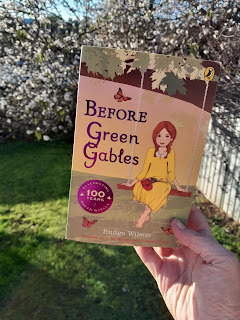
Summary: This is the story of Anne Shirley's very young life before the Green Gables years.
MY THOUGHTS:
I found this novel in a local secondhand shop. Although I had misgivings about stirring up this part of Anne's life, fanfics of old classics are one of my passions, so of course it came home with me. It turns out this prequel was authorized by the heirs of L.M. Montgomery, and it's instantly clear that Canadian kids' author Budge Wilson took the honor seriously. The events play out according to canon. Wilson draws specifically from what Anne tells Marilla in Chapter Five of Anne of Green Gables, entitled Anne's History, along with Chapter 21 in Anne of the Island, entitled Roses of Yesterday, when Anne, as a college student, visits her parents' little yellow house and their gravesites.
Wilson also attempts to fill in the characters of Anne's earliest guardians, the Thomases and the Hammonds. But the novel begins with poor Bertha and Walter Shirley, who never realized how short their days were numbered, and ends with Anne on her appointment with destiny, where she's soon to meet Matthew Cuthbert at Bright River Station. It took confidence on Budge Wilson's part, to imagine she could replicate the magic of the original, and sadly I don't think she's pulled it off. There are four main reasons why.
1) The genre is said to be children's fiction, but I consider it too bleak for kids. The starting point, with Bertha and Walter, is heartrending. Who was Wilson's ideal reader? Lots of little girls I know, (including my old self), would have found the subject matter far too harrowing. And I'd bet minutiae about housekeeping gets tedious for young readers. Yet it surely isn't an adult or YA novel either, crammed as it is with Anne's streams of consciousness at the ages of five and six, including long soliloquies to 'Katie Maurice' in the glass. (Dare I admit these get very boring!)
2) An omniscient narrator frequently pops up to embellish Montgomery's details, shovelling on more injustices. Wilson adds extra layers of rejection and unfairness to Anne's very early life that we never imagined. I can't help making my objections in capitals. SINCE ANNE'S BACKSTORY WAS ALREADY SO BAD, WHY MAKE IT EVEN WORSE? And just so nobody misses any injustice, the narrator often ends chapters with remarks that state the obvious, such as, 'Anne had no idea what she (Mrs Thomas) meant, nor would she ever find out.'
3) Anne herself, although lovable and poignant, isn't the same Anne we bond with throughout the rest of the series. Within these pages, tiny Anne Shirley is depicted as preternaturally wise with an uncanny knack of reading into others' deepest motivations. Yet Montgomery's Anne retains a certain vivacious sparkle, whimsy, and innocence that Wilson's Anne lacks. That being the case, this unintentionally misses the goal of staying true to the original character's voice.
And when it comes to unlikelihoods such as drunken Mr Thomas taking advice from 5-year-old Anne, it loses credibility fast.
4) This story also lacks Montgomery's trademark sense of humor. I'm not claiming Budge Wilson had no sense of humor at all. It's just not the same style, or as refreshing as Montgomery's. Perhaps finding glimmers of humour in Anne's tragic backstory is simply too big an ask.
Overall, I wouldn't recommend this to fellow Anne fans. Although I could see that Wilson tried very hard, the canvas she starts with swings between too horrific or too mundane. I'm sure Montgomery intended it as mere backstory for an excellent reason.
🌟½
August 5, 2025
'Small Bomb at Dimperley' by Lissa Evans
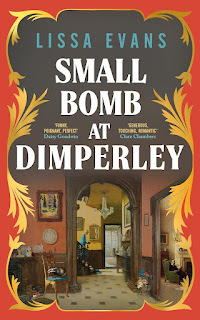
This is a British novel by an author I'd never heard of, but I saw it highly recommended by another book blogger. When I checked it out, I decided to take my chance on a kindle copy, because it sounded right up my alley. Crumbling country manor house compiled of patchwork sections from different eras, post WW2 tale that's hailed as a joyful historical novel, sly digs at Britain's landed gentry, and heartwarming romance. What's not to love?
MY THOUGHTS:
It's 1945, the wake of WW2. As her hodgepodge ancestral home, Dimperley Manor, deteriorates around her ears, snooty elitist, Lady Irene Vere-Thissett mourns the diminishing adulation she considers her due, along with the death of her eldest son, Felix, who was everything a young baronet should be; handsome, polished, and suitably imperious.
Lady Irene's second son, Cedric, can't possibly inherit the family title in Felix's stead, for a childhood bout of encephalitis arrested his mental development. The successor will have to be Valentine, the plain and inept baby of the family, who she's always brushed aside as an embarrassment and disappointment. Most galling of all for her is the fact that despite his aristocratic birth, he considers himself no better than anyone else (shock horror)!
Twenty-three-year-old Corporal Valentine Vere-Thissett baulks at the sudden inevitability of assuming the title of 'Sir.' As third in line, it'd always seemed a safe bet that he'd never have to step up, but now he's inherited the nightmare of a property in dire financial straits, with its dilapidated hazards and skeleton staff. His own estimate of his capability is rock bottom. All written documents have a rebellious habit of spinning and blurring whenever he tries to focus. (We readers recognise undiagnosed dyslexia, but he still believes his school teachers, who simply labelled him a dunce.)
Meanwhile, others under Dimperley's roof try to move on with their disrupted lives. Felix's disheveled widow, Barbara, chafes under the control of her overbearing mother-in-law, while her teenage daughters, who'd been evacuated to America are now home dealing with tremendous culture shock. Pedantic Uncle Alaric is writing a drawn-out volume of family history which nobody has the heart to tell him is excruciatingly boring. But Alaric's capable secretary, Zena Baxter, turns out to be an unexpected ally for Sir Valentine.
Zena is a working class girl with a history of being shunted from one foster home to the next. She's the struggling single mother of a precocious three-year-old, and depends on her efficient organizational skills to make ends meet. While the Vere-Thissetts are all too close to the situation to think creatively, Zena just might have an unexpected idea to help save the property. She's fallen under the spell of Dimperley Manor, but her feelings for the young baronet take a surprising turn as well.
Shout out to Zena's daughter, Allison, who deserves a special mention as an authentic, large-as-life three-year-old-character. Such youngsters are notoriously difficult to write authentically, but Evans has a brilliant way of weaving Allison's interruptions and non sequiturs into each scene so they become an integral part of the action.
I'm so glad I took the chance on this book. There are some hilarious laugh-out-loud moments. At it's core is a lovely romance between two great protagonists whose social backgrounds are poles apart, and who have both been emotionally damaged in different ways, yet who complement each other perfectly. The shocking turn of events is exciting too. I wonder if there will be a sequel to this. I guess it's no spoiler to surmise that Zena will be in for some serious mother-in-law friction.
🌟🌟🌟🌟🌟
July 29, 2025
'Dark Quartet' by Lynne Reid Banks
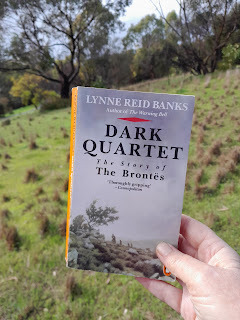
I discovered this in one of my favorite secondhand bookshops which was sadly soon to close down, and it renewed my interest in all things Bronte related.
MY THOUGHTS:
This biographical novel from 1973 about the brilliant siblings from Haworth is an intense and mind-blowing read. Lynne Reid Banks thoroughly did her homework. Her forays into the inner lives of these four seem (mostly) consistent with what has been confirmed about them from the reams of correspondence they've left behind. Leaving room for poetic license, the book is sensitively written, with threshed out trajectories all round. Its title is well chosen, for their true lives were surely as Gothic and harrowing as anything they ever wrote.
It's hard to decide where to jump in and discuss something with so broad and deep a canvas, so I'll tackle each of the four main subjects according to birth order.
The book delves into Charlotte's intense, private guilt, for feeling more passionate about her own secret world than she does about the conventional Anglican Christianity that is preached all around her. Yet she cannot change a thing, spurred on by the physical excitement she generates inside herself by her characters' elicit passions. (Whoa!) Even the poet laureate, Robert Southey, writes Charlotte a stern warning, to the effect that young ladies shouldn't let their imaginations run away with them. But any resolutions to guard her thoughts are feeble, since the fantasy world she's created is all-consuming. According to her aunt's and father's Calvinistic tinged strictures, Charlotte can't help fearing she must be damned.
Branwell comes across as witty, highly-strung, ever on the verge of breakdown, and in all likelihood a pain in the neck. He's not a fraction as confident as he tries to appear. Rather, he's a tortured soul who fears he'll always be a fall-short, unable to muster what it must take to satisfy the high hopes his family have pinned on him. He's undisciplined and reactive, allowing himself to be tossed about by any wind blowing. His petit mal seizures, commonly known as absence seizures today, alarm his family. (I know other biographers throughout the years conjecture that it was epilepsy.) And he seems to be allergic to actually finishing anything.
I find Banks' dour dramatic version of Emily hard to like but easy to admire. Blunt and reclusive, she's also a nature mystic, but specifically for one spot; her beloved Yorkshire Moors. This goes hand in hand with a weird astral travel ability. (Did she really experience these out-of-body journeys? I can't find any factual backup.) A great admirer of strength and determination, she scorns herself as a weakling for retreating from Roe Head school with intense homesickness, but directs her self-criticism into shaping her writing to be the finest it possibly can.
Anne, perhaps the least 'dark' of the quartet, takes upon herself the earnest anxiety of a youngest child to see everyone happy and content around her; an impossible task with her complex siblings and vulnerable father. (I still think she should have quit her position with the Ingham family, rather than gritting her teeth and toughing it out because she had something to prove. Hence she ends up being fired, which I can't help thinking was partly her own fault. See my review of Agnes Grey, her biographical novel.)
It's all such interesting fodder, including Emily's hero worship of her employer, Miss Elizabeth Patchett, who resembles a favorite heroine Emily has created; and the formally written marriage proposal Charlotte receives from Henry Nussey, which may have influenced that abysmal proposal made by St. John Rivers to Jane Eyre. We meet the sunny natured curate, Willy Weightman, such a contrast to the dark quartet that all four can't help basking under his refreshing influence. There's a plausible reason why Branwell, in a fit of gloom, scrubs himself out of the famous pillar painting. And I love Charlotte's brush with the Catholic priest who tells her, 'Those who suffer as you are suffering often have a vocation to ease the anguish of others.'
Of course Banks introduces the two married people who Charlotte and Branwell fall for. Monsieur Heger is depicted as a principled and decent (albeit overbearing) guy whose powerful sway over Charlotte occurs despite himself, but Mrs Lydia Robinson is portrayed as a heartless and duplicitous cougar.
I seem to remember reading somewhere that when Elizabeth Gaskell wrote her 1857 biography of Charlotte, Mrs Robinson attempted to sue her for defamation over claims that she seduced Charlotte's younger brother. However, Dark Quartet was written well into the twentieth century so Banks didn't have the same problem. She paints Branwell's temptress with a thoroughly black brush. I wonder if Mrs Robinson's descendants remember her as the villain who ruined his life, and if so, whether the passage of time has made it more of a cool detail to include in their lineage than a source of shame.
I took my time over this book. It wasn't one I could possibly rush through, and it wasn't easy to take all the harsh blows on board, but the effort was well worth it. However, the heavy emotion lingers. The world was robbed of whatever novel Emily was working on at the time of her death, and it might've been astounding, coming on the heels of Wuthering Heights. And I find the rift between Charlotte and Branwell, lasting until the day of his death, is heart-rending. Close to the end, Banks has him say, 'Charlotte, who was once closer to my heart than my own left lung, now withholds herself from me as if she fears to become a drunkard and wastrel herself just by looking at me.'
And I won't even get started on the early chapters which dealt with the deaths of Maria and Elizabeth. They were almost too much for me at the outset.
My fascination for the Brontes has been well and truly re-ignited by this book. I visited Haworth Parsonage once, aged 20, and I'd swear you really could feel their creative, brooding energy still caught between those walls.
I guess I'd better warn you to expect more Bronte posts down the track.
🌟🌟🌟🌟½
July 22, 2025
Agatha Christie - An Autobiography
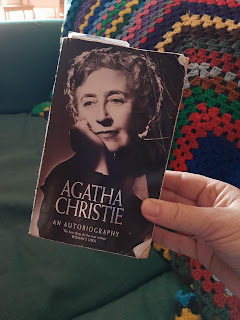
When I bought this from the bargain table of a secondhand bookshop, the lady behind the counter predicted that I'd really enjoy it. She was spot on, although I initially balked at the size, thinking, 'This had better be good, Agatha!' It exceeded my expectations by far, and I know it'll be high among my ten best reads of the year. It's brimming with humor, and wise philosophical observations which come from living a long and interesting life.
MY THOUGHTS:
As far as I see, Agatha Christie's tips for living a good life amount to four key attitudes
1) Try anything once.
2) Be flexible.
3) Set your mind on stubborn enjoyment. (If she were taking a gift to a child at a christening, Agatha would choose a naturally happy frame of mind.)
4) A sense of humour is vital.
On a personal note, I was instantly riveted because Agatha's early family dynamic was an exact replica of mine. She was the baby of the family, with a far older sister and brother, which meant she was frequently thrown on her own resources, and had to invent her own private style of fun from scratch. Perhaps being the late addition to any family unit helps us dig deep to craft our own personal inner world. I once considered it a drawback of my own life, but now, with the help of this book, see it as a formative benefit. And Agatha exited this world in the same decade I was just beginning it, the 1970s.
The autobiography begins with Agatha's early childhood during the late Victorian era with her parents, older siblings, and a household of servants in their beloved and blessed home named Ashfield. Agatha remembers the servants being happily appreciated for doing excellent, expert work. In her memory, they often loom as tyrants rather than menials.
Her reflections about this stage of her life have convinced me that no modern person can possibly even begin to imagine the standard of fun enjoyed by Victorian and Edwardian kids from well-off families.
Interestingly, Agatha doesn't recall her early world being remotely patriarchal, the way we've come to understand the word. The old matriarchs ruled the social fabric with rods of iron.
She says:
'We women have behaved like mugs. We have clamoured to be allowed to work as men work. Men, not being fools, have taken kindly to the idea. Why support a wife? What's wrong with a wife supporting herself? She wants to do it. By golly, she can go on doing it.'
This girl took everything in her stride, including a teenage ambition to become a concert pianist, hard, gruelling VAD work nursing during her twenties in WW1, and later in the hospital dispensary, where she learned a lot about poisons and different substances that benefited her mystery writing in the years ahead. And she always manages to piece out fascinating, hilarious incidents from the mundane.
She describes her marriage to Archibald Christie, the first great love of her life, the birth of their daughter, Rosalind, and the aftermath in which Archie breaks their marriage and Agatha's heart when he leaves her for another woman. This book has softened my opinion of Archie, although I expected the opposite. For Agatha herself paints a great picture of him, and a bit of googling reveals that Rosalind remained on good terms with her father, and that far from being a general two-timer and cheat, he stuck with his second wife, Nancy, until the end of his days.
The latter part of the book covers Agatha's second marriage to the archaeologist, Max Mallowan, who was fourteen years Agatha's junior. It includes heaps of travel to exotic and daunting locations, their lifestyle on his excavation sites in the middle east, and their survival during the second great war of that terrible 20th century.
Her musings about progress, and what might be in store for us next, are rather ironic. ('I would like to be able to look into the future and see the next steps: one feels they will follow quickly on one another now, with a snowballing effect.') What would Agatha think if she knew the future would contain an AI version of herself teaching a virtual creative writing class, for that fact has been popping up on my newsfeed recently. From the tone of this book, I imagine it might be shock.
The only slight warning I'll offer is that Agatha, swept along by nostalgia, gets a bit plot-spoilerish about some of her earliest titles. So if you haven't read them yet, keep this in mind.
So as not to inflate this review unduly, I'll add another blog post down the track specifically dealing with Agatha Christie's reflections about writing. For now, I'll finish off with a great quote from the autobiography.
'It is astonishing how much you can enjoy almost everything. There are few things more desirable than to be an acceptor and an enjoyer. You can like and enjoy almost any kind of food or way of life. You can enjoy country life, dogs, muddy walks, towns, noise, people, chatter. In the one there is repose, ease for nerves, time for reading, knitting, embroidery, and the pleasure of growing things. In the other, theatres, art galleries, good concerts, seeing friends you would otherwise seldom see. I am happy to say that I can enjoy almost everything.'
🌟🌟🌟🌟🌟
The Vince Review
I invite you to treat this blog like a book-finder. People often ask the question, "What should I read next?" I've done it myself. I try to read widely, so hopefully you will find something that will strike a chord with you. The impressions that good books make deserve to be shared.
I read contemporary, historical and fantasy genres. You'll find plenty of Christian books, but also some good ones from the wider market. I also read a bit of non-fiction to fill that gap between fiction, when I don't want to get straight on with a new story as the characters of the last are still playing so vividly in my head. ...more
- Paula Vince's profile
- 108 followers



